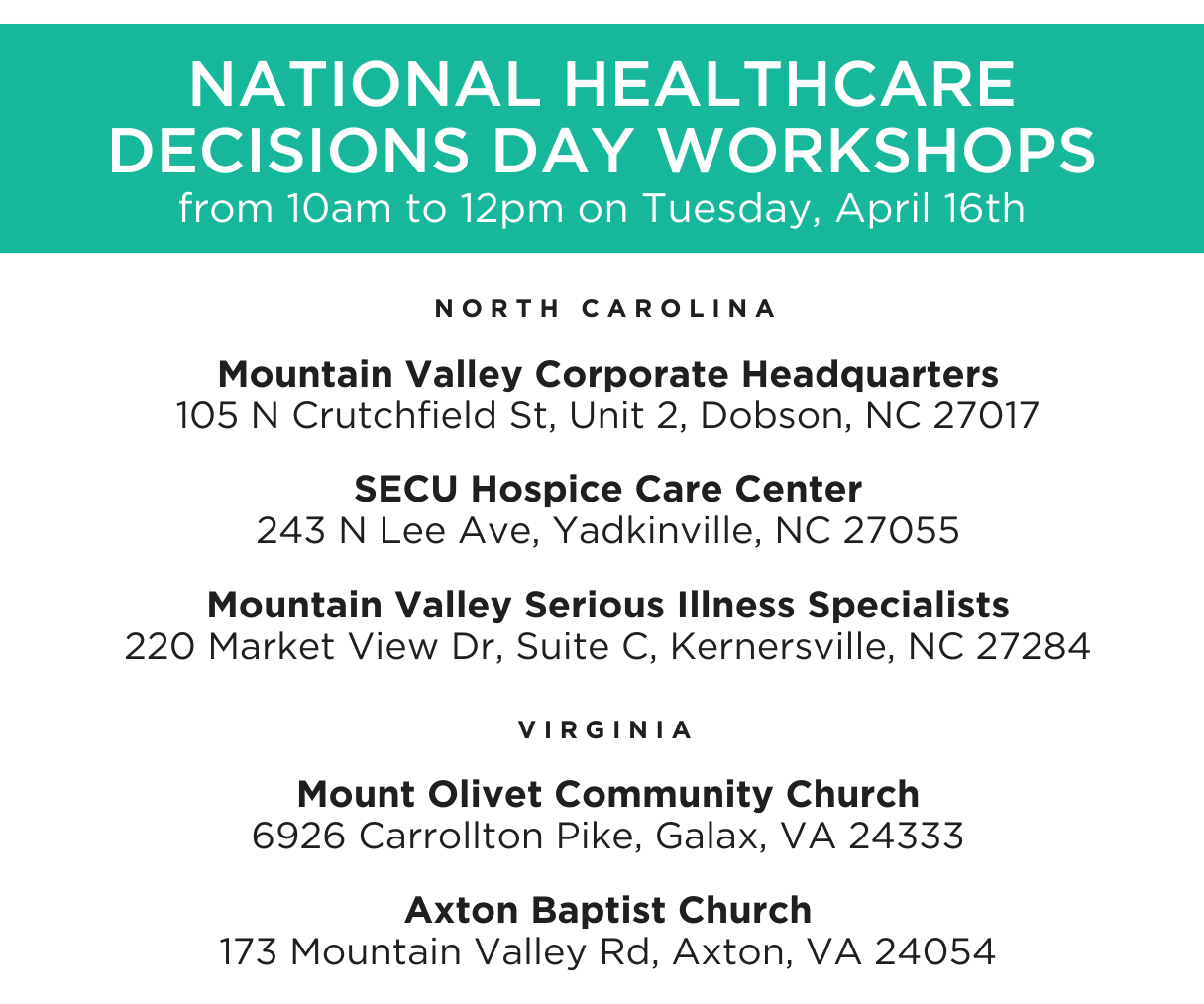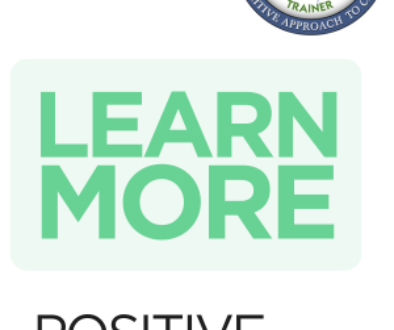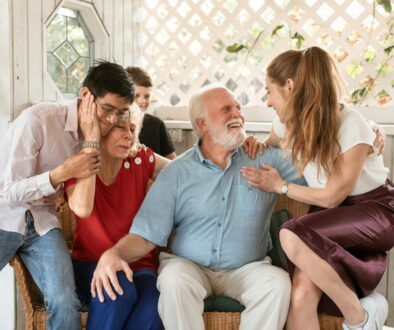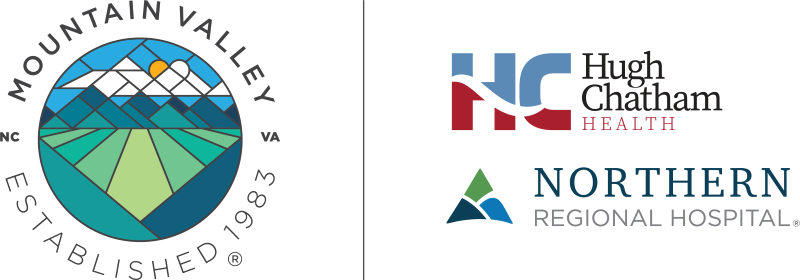Healthcare Decisions: When and how do I make them?
April 16 is National Healthcare Decisions Day. Mountain Valley is here to help you understand and document your healthcare wishes!
Our team members are trained to help you with all of the end-of-life legal documents authorized for use in North Carolina and Virginia.
We’re offering five workshops hosted by knowledgeable staff to help you understand the documents you should have in place to make your healthcare wishes known. To help spread the word, we asked Kelly, one of our nurse practitioners, to share a story that highlights the importance of making your end-of-life care preferences known.
Read more below!
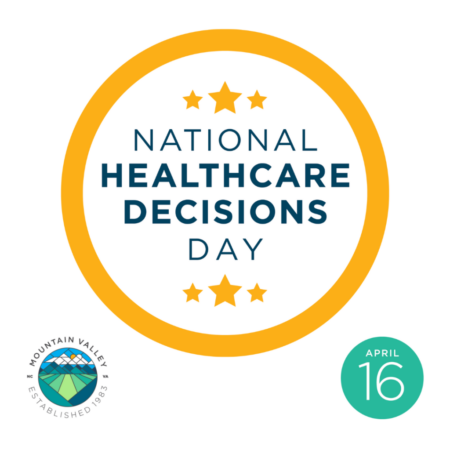
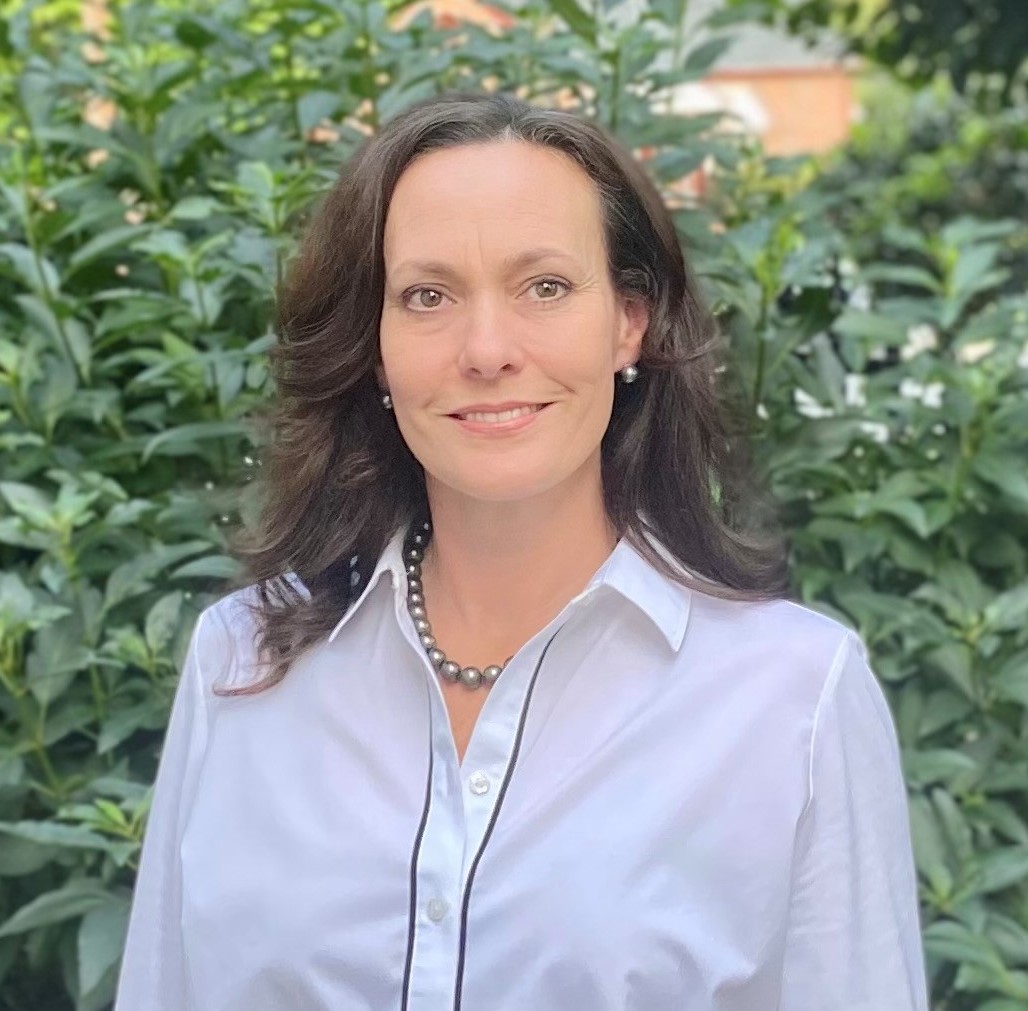
Kelley Waite
ARNP-C
“A recent experience with a vulnerable patient drove home the importance of making the time for conversations in which we make our healthcare wishes known and document them effectively.
As we pause and call attention to National Healthcare Decisions Day, I hope Dan’s journey will inspire you to take action and make a plan for your own future.”
Unspoken desires: A success story highlighting the importance of documenting your healthcare wishes before navigating end-of-life care
Kelly Waite, ARNP-C
As a certified hospice and palliative care nurse practitioner, one of the most important things I can do early on is helping families with advance care planning. It’s an opportunity to sit down with them and discuss their goals and wishes for their future should an accident or illness progress to a point they are unable to speak for themselves. This process also empowers a patient and lets them stay in control of their body and future should they be in a vulnerable state. It’s a time to make sure their loved ones understand their wishes and, if needed, appoint a healthcare power of attorney who could act on their behalf if they become unable to respond or reason.
A recent experience with a vulnerable patient drove home the importance of making the time for such conversations. I was called to a skilled nursing facility to see a patient; we’ll call this patient Dan in this story. Due to lack of social support, the state had become Dan’s guardian and I was met by a social worker representing the state on his behalf. Although the gentleman was both immobile and unable to speak, his eyes were open and alert. I introduced myself to him and spoke to him with gentle voice and touch. I then asked him if he could blink. When he could do so, I asked him to blink once for yes and multiple times to respond no.
The social worker was shocked to see that he could respond to both requests and that his mind was intact despite his inability to use the majority of his body. Through a series of blinks we were able to have a conversation about his wishes. He was able to consistently and clearly answer questions, showing that he had the mental capacity to make decisions, and he was able to tell me he did not want any further life prolonging measures, including the feeding tube that was currently being used.
Despite his cognitive capacity and ability to express his wishes, the state was in charge of his decisions now. Had there been an advance care plan in place, his wishes could have been honored without involvement from the state; however, because of the circumstances the state was the only body with the power to allow or deny his wishes.
Fortunately, I was able to get approval from the state via his social worker to stop tube feedings and keep Dan comfortable to avoid prolonged physical and mental suffering. I followed up to see him multiple times along with daily nursing visits to treat his pain and to ensure he was not experiencing hunger or other suffering. Due to conflicting policies, the skilled nursing facility would not accept the state-provided Do Not Resuscitate (DNR) order. The facility would only accept a Medical Orders for Scope of Treatment (MOST) form that our state does not typically provide for those in their care. It was essential to obtain this so that our patient could pass peacefully when his natural life ended.
Thankfully, I had encountered an equally committed and caring state social worker, and we were both determined to help Dan live comfortably and die naturally. After going through multiple layers of approval she was able to obtain permission to make a one time exception and complete a MOST form. We met in a parking lot as we both rushed between other patient visits, to exchange this critical piece of paper, which I then delivered to the facility with haste.
The concentrated effort by committed healthcare teams and social workers made it possible for Dan to pass peacefully and comfortably as he desired. While this particular situation turned into a success story, it represents a failure of planning that could have prevented Dan’s wishes from being met for his end-of-life care. Had Dan documented his healthcare wishes through an advance care plan earlier, we could have completed a MOST form to reflect his wishes for no feeding tube and no CPR, and he would have been spared suffering and confusion.
As we pause and call attention to National Healthcare Decisions Day, I hope Dan’s journey will inspire you to take action and make a plan for your own future. In doing so, not only can your wishes be fulfilled, but we can bring some purpose to this man’s difficult days and spread goodness in his memory and honor.
Attend a workshop on April 16th and make a plan to document your healthcare wishes.
If you cannot join us, contact a representative at (336) 789-2922 and schedule an onsite presentation or personal consultation.
Important documents:
- Living Will
- The Five Wishes®
- Do Not Resuscitate (DNR)
- Health Care Power of Attorney (HCPOA)
- Medical Orders for Scope of Treatment (MOST)

